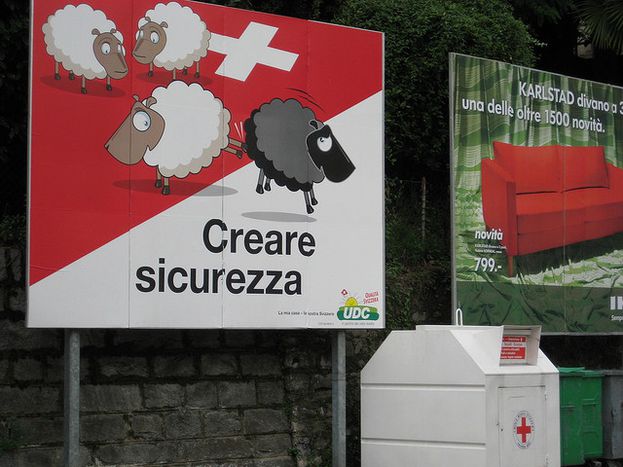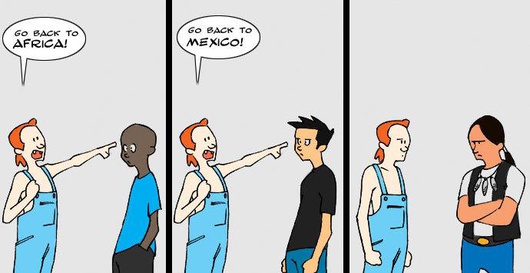
Immigrant is the new black
Published on
Switzerland introduced the quotas for immigrants, U.S. immigration reform ended up in the trash and the U.K. immigration minister has resigned after revealing that he has employed illegal house cleaner. Immigration has become a subject of political bickering, but the figure of an illegal immigrant symbolizes a lack of understanding of modern globalized world.
Would Switzerland qualify for the World Cup if they got rid of immigrants? This photo, that went viral on Twitter, shows that native Swiss are less than half of the first squad of their football national team. Their biggest stars are Gökhan Inler, who is Turkish origin, and Xherdan Shaqiri, who was born in Yugoslavia to Albanian parents. But if the World Cup in Brazil goes wrong they will probably take the whole blame, as happened with the French team after they were knocked out in group stage in South Africa in 2010. French public opinion then have wondered if players like Nicolas Anelka, Samir Nasri, Karim Benzema or Hatem Ben Arfa are French enough. Surprisingly, no one questioned the Frenchness of Zinedina Zidane, Youri Djorkaeff or Lilian Thuram when won the World Cup in 1998. Human memory can be short and selective.
But the number of foreign born player will probably drop in Switzerland national team thanks to the newly introduced laws. The people decided in the referendum that they want to limit the influx of immigrants from the European Union by introducing strict quotas. The EU officials are pissed because Switzerland is bound by trade and labour agreements with them. The result of the referendum is a great success of The Swiss People’s Party (SVP), which previously was made famous by such initiatives as ban burqas and the construction of minarets.
The United States of immigrants
 In his State of the Union from last year, President Barack Obama promised to work on immigration reform. This year that topic disappeared from the agenda. The reform does not have a chance to go through the House of Representatives where the Republicans are in charge. In the November election to Congress the case will not be an issue, because over 60% of House GOP members represent congressional districts where Latinos represent a small percentage of the population. And the aim of the Republicans is to deprive the Latinos their voting rights, because they, in the vast majority, are going to vote for the Democrats.
In his State of the Union from last year, President Barack Obama promised to work on immigration reform. This year that topic disappeared from the agenda. The reform does not have a chance to go through the House of Representatives where the Republicans are in charge. In the November election to Congress the case will not be an issue, because over 60% of House GOP members represent congressional districts where Latinos represent a small percentage of the population. And the aim of the Republicans is to deprive the Latinos their voting rights, because they, in the vast majority, are going to vote for the Democrats.
Immigration is not the problem to the U.S. elite. Rapid economic growth has occurred when American technical thought and mass production went hand in hand with slavery and illegal immigration. Industrial development, which caused that at the turn of the 19th and 20th century the United States has become the most powerful economy in the world, was the result of unlimited immigration, mainly from Ireland and Southern and Eastern Europe.
Lampedusa - a symbol of european failure
 It is beneficial for the entire European Union when immigrants are illegal, because then they are easier to control and they are cheaper. This conclusion comes from the book "A Sud di Lampedusa" ("South of Lampedusa") by Italian journalist Stefano Liberti. A large part of the Italian economy, such as agriculture, is based on illegal immigrants and the phenomenon of slavery exists even in such "civilized" places like London.
It is beneficial for the entire European Union when immigrants are illegal, because then they are easier to control and they are cheaper. This conclusion comes from the book "A Sud di Lampedusa" ("South of Lampedusa") by Italian journalist Stefano Liberti. A large part of the Italian economy, such as agriculture, is based on illegal immigrants and the phenomenon of slavery exists even in such "civilized" places like London.
We cannot stop immigration. Building a fortress in the Mediterranean Sea will not scare them away, but only increase the danger in the region. Immigrants and refugees are often educated, but defeat of the European system is that we force them to exist on the margins of society. And the old Europe needs young blood.
In contemporary world, where the revolution is inspired by the social media and the Arab Spring leads to the Occupy Wall Street movement, people will travel and communicate with each other. This is the reality in which we live in and nostalgia for the old uncomplicated world will not change anything. The issue of immigration more and more often becomes the matter of political wrangling and not the subject of potential laws. And the problem is still there even if we are not looking at it.



